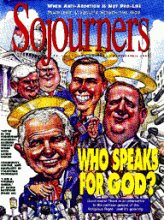It was inevitable that our de facto federal ministry of culture (public broadcasting and the endowments for the arts and humanities) would be among the first and most visible targets when Newt Gingrich, the Trotsky of the Hard Right, took the House. Like his Bolshevik predecessor, Gingrich
has always taken cultural politics very seriously. This inclination is one of the main reasons why the Right has been so effective in addressing the frustration that has brewed for the past 15 years among lower-to-middle-class white Americans.
Cultural issues-questions about values and meaning and the ties that bind, or don't-are central for all turn-of-the-century U.S. politics. And cultural institutions-the mass media, the schools, the popular arts-are both the site of the battle and the prize for the winners.
Cultural politics is, of necessity, mostly symbolic politics. In this phase of the culture war, Newt and his buddy Sen. Larry Pressler (R-S.D.) have targeted public television as an intensely visible symbol of the way "normal Americans" are oppressed by the elites who control national bureaucracies. They say public broadcasting is used by the elites to serve their refined tastes and pampered sensibilities, while the rest of us pay the bill.
Is public TV really what Newt calls it-"a sandbox for the rich"? Is it rendered irrelevant by the age of cable? To answer that question for myself, I analyzed the evening schedule for a typical week on Washington, D.C.'s WETA-TV, one of the "feeder" stations of the PBS chain.
Read the Full Article
